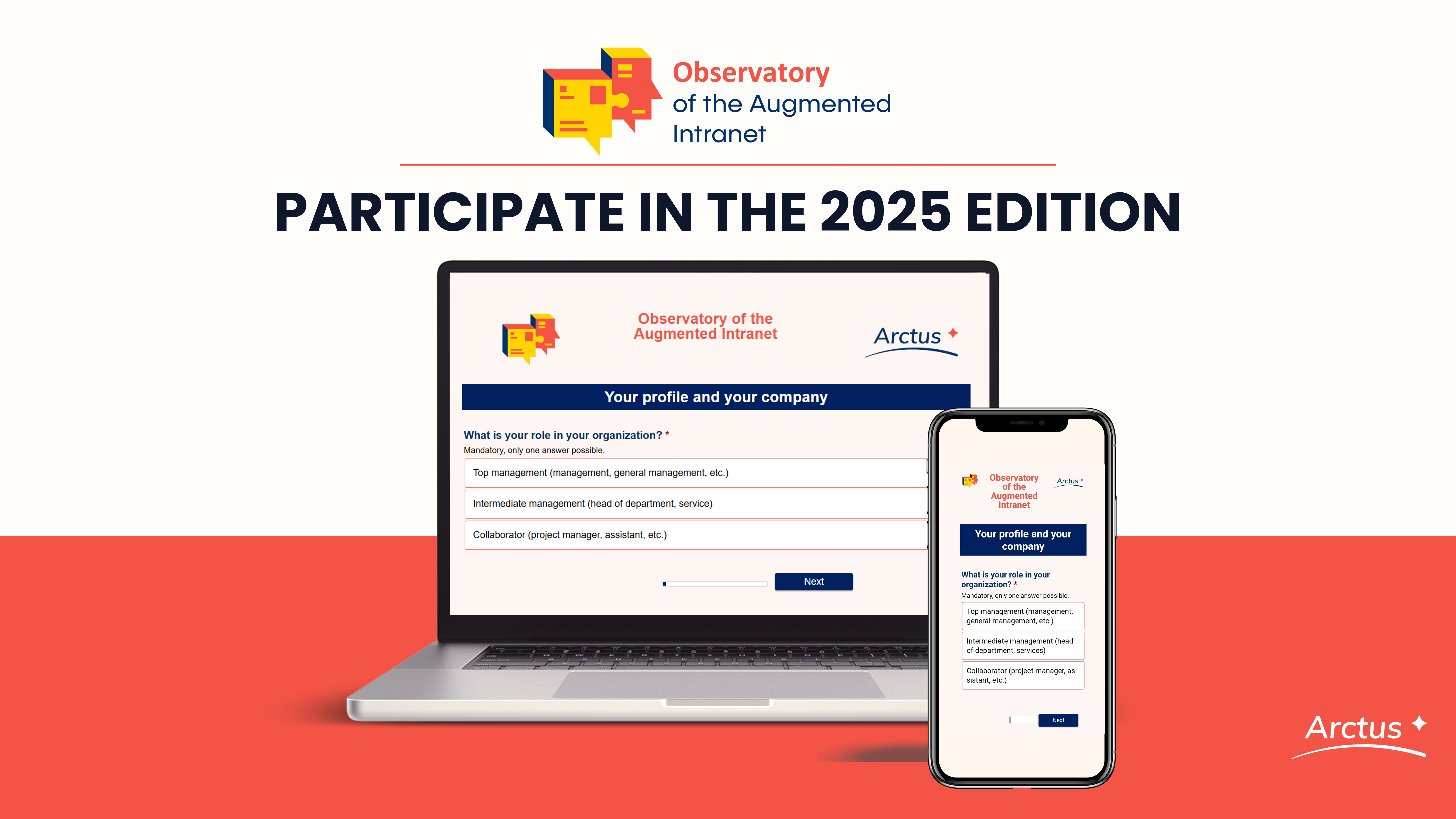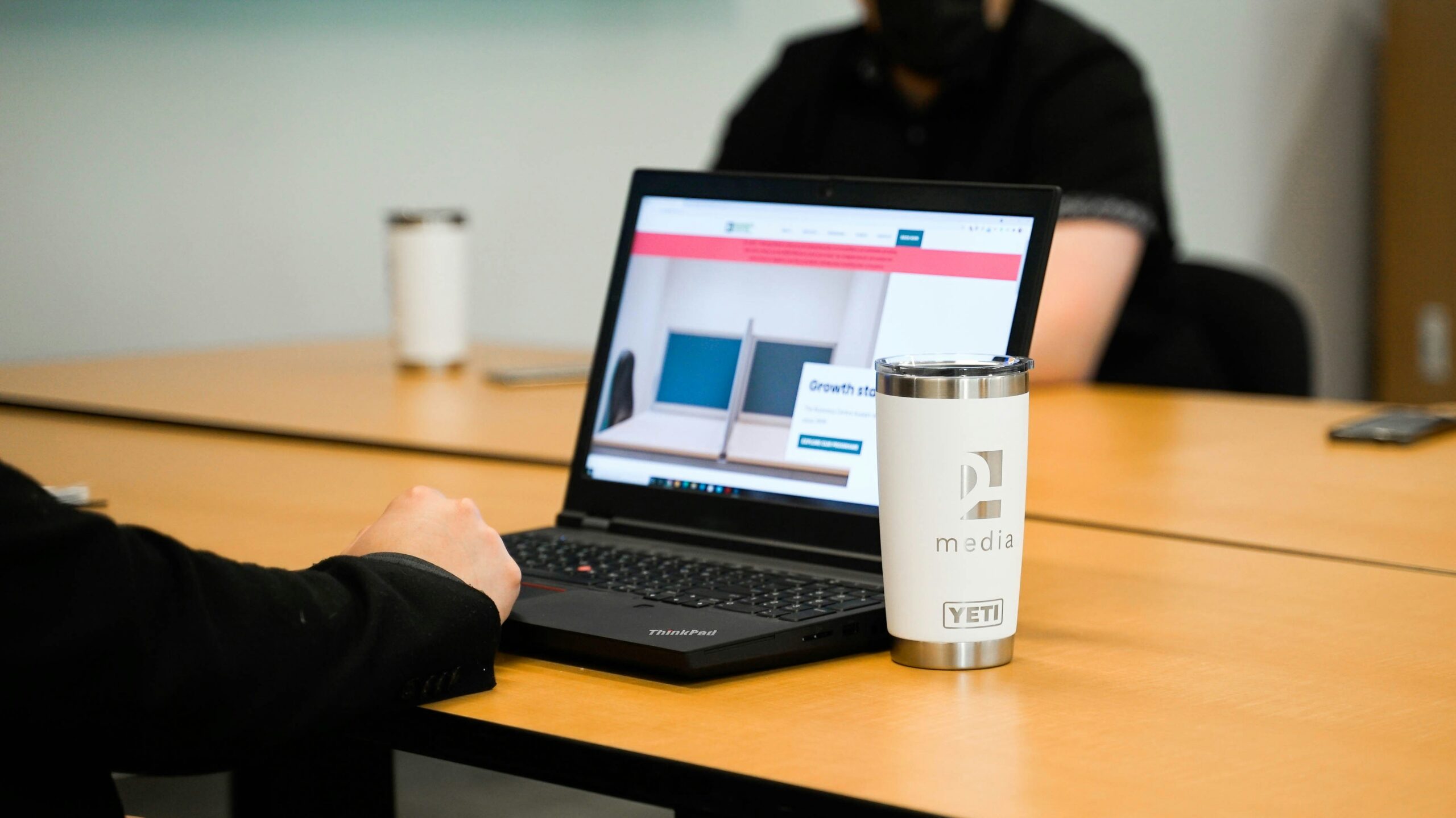THE 7 KEY FINDINGS OF THE INTRANET AND DIGITAL COMMUNICATION OBSERVATORY

22 June 2023

The Arctus 2023 Intranet and Digital Communication Observatory, a survey conducted among 401 French professionals in the areas of internal communication, digital workplace and employee experience, provides valuable insights into trends in internal digital systems. Explore how these key findings can assist you in evolving your practices and optimizing your employees' digital work environment.
1. The intranet at the heart of internal communication and at the service of optimized interactions
The intranet plays a central role in internal communication and fosters social cohesion within organizations. According to the survey, a majority of respondents now recognize "Streamlining internal communication" (69%), "Enhancing operational efficiency" (59%), and "Promoting knowledge capitalization" (59%) as top priorities, with an 8-point increase in each category."
The ease of accessing information and capitalizing on available knowledge represents a critical factor for operational efficiency in companies. In this regard, the communicator's capability to target their communication across various channels, as well as the employees' ease of accessing both hot and cold content, are of utmost importance.
2. Mature governance focused on content

Intranet governance revolves around content and involves the establishment of steering committees. The survey reveals that 42% of organizations have implemented such committees (vs. 30% in 2021), indicating that intranets are receiving greater attention and commitment. The intranet hosts a diverse range of editorial formats. News remains the predominant content for slightly over three-quarters of respondents, followed by static information (58%) and video and animated content (57%), with events (53%) following closely behind.
The stakeholders involved in the intranet and their influence within the system are evolving and diversifying. On one hand, the communications department is solidifying its position as the primary driver of intranet management, rising from 37% in 2021 to 57% in 2023... while the HR department is trailing behind at 25%. On the other hand, in terms of decentralized contributions, we observe that 61% of organizations actively engage professionals from various departments, with 40% of them being highly active contributors alongside the Communications and HR teams.
"This increasing institutionalization of governance mechanisms is expected to persist in the coming years. With the proliferation of communication channels and the influx of information into employees' informational landscape, there will be a rising demand for greater control over the production and dissemination of information. This will enable maximizing its impact and fostering stronger commitment."
Isabelle Reyre, Associate Director, Arctus
The increasing involvement of professions in content production is also consistent with what we observe among our clients. To capture employees' interest, foster a sense of belonging and commitment, and facilitate the sharing of localized content (geographical, professional, etc.), which is more personalized, is highly favored by them.
3. The unified digital workplace experience does not impose itself

Internal digital systems are still mostly presented or perceived as "classic info-com Intranets" in over 1/3 of cases. The term "Digital Workplace", as an internal digital device offering a totally unified user experience, is used by only 21% of organizations. The Digital Workplace has yet to make its mark. It is true that the investment required is an obstacle. The trend towards fragmentation, already observed in the 2021 edition, is confirmed.
However, among respondents who have deployed a digital workplace, employee satisfaction and platform usage levels are higher. More and more players (CMS Intranet, Microsoft Viva, ServiceNow, and a number of HRIS, ERP and CRM software publishers, etc.) are taking up the challenge of becoming "the heart of the digital workplace". These ambitions contribute to the complexity of CIOs' urbanization decisions, which can be another obstacle to its development.
4. Is digital technology a lever for improving Quality of Life at Work? Not really!
The 2023 Observatory highlights a significant change in attitude towards digital. After a period of integration of new digital uses, particularly during the pandemic, only 16% of employees believe that digital developments will continue to improve the quality of life at work (versus 36% in 2021).
The clear decline in the improvement of QWL as an opportunity offered by digital technology illustrates that the benefits of digital technology have already been integrated into everyday life, and is no longer a standalone subject.
"The evolution of the organization and the adaptation of management represent the next avenues for improving quality of work life. A thoughtful and controlled use of AI can undoubtedly contribute to this as well."
Isabelle Reyre, Associate Director, Arctus
5. An intranet not addressing the needs of disconnected populations?
Half of the companies report having disconnected employees. Furthermore, respondents believe that this population is not at all committed to digital transformation. Why is there such a lack of commitment? The Observatory reveals that non-connected individuals do not feel concerned about digital systems, either due to a lack of time (52%), a lack of digital skills in a professional context (51%), or quite simply because the intranet doesn't meet their needs!

While it may seem illusory, or even inappropriate, to try and engage 100% of the workforce in digital when part of the business doesn't use digital tools, the opportunities for inclusion are multiplying. Many companies are deploying display screens, mobile applications or mobile intranets, always with a real focus on putting targeted content and services online.
6. GAFAM vs. sovereign solutions: a growing concern for companies
Microsoft's hegemony in office environments is consolidating: 79% of respondents declare that they use a Microsoft solution, a dominant position that has risen by 7 points compared to the 2021 edition of the Observatory.
However, concerns about sovereignty and "no GAFAM" (Microsoft, Google...) are becoming more visible. 14% of respondents have opted for alternatives to Microsoft and Google, motivated by the quest for digital sovereignty (76%), a militant "no GAFAM" choice (60%) or cost issues (55%).
7. The impact of generative AI on content production

Generative AI is a growing concern in internal communications. 43% of organizations are already using AI technologies to generate content, but 52% of professionals are concerned about the validity of AI-generated content. Communication departments are called upon to play a key role in overseeing and ensuring the quality of AI-generated content, in order to maintain user confidence.
Conclusion
The legitimacy of the intranet is confirmed within companies in a context of accelerated transformation. The role of communicators has returned to the forefront of users' expectations, informing and guiding them in this rapidly changing environment. Regarding generative AI, it will be necessary to establish usage rules, governance and strict ethical conditions for the use of these tools, to ensure the reliability of the content.
METHODOLOGY
Survey conducted among 401 respondents from 377 French companies of all sizes in the service, industry, administration and parapublic sectors, representing over 4.2 million employees, via an online questionnaire open from January 4 to April 7, 2023.
To discover the detailed results of the study, download the full report.
For a personalized presentation of the Observatory's findings, or to discuss your internal digital projects, contact us..
Missed the webinar presenting the survey results ?
Watch the replay (in french) of the session hosted by Isabelle Reyre and Bernard Baron, Associate Directors of Arctus, with the participation of Yann Vialet, Digital Workplace manager at Technip Energies.


